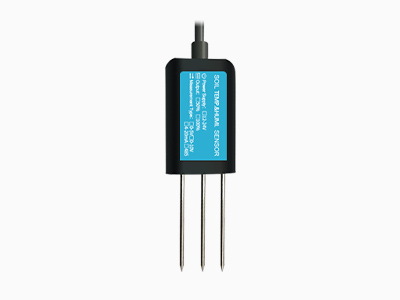Maintaining optimal levels of soil moisture is essential for healthy plant growth and crop yield. Soil moisture probe plays a crucial role in determining the success of agricultural practices. To achieve this, farmers and researchers rely on soil moisture detectors to monitor the amount of water in the soil. In this article, we will explore the significance of soil moisture detectors in agriculture.

Benefits of Using Soil Moisture Probes:
1.Accurate Measurement: Soil moisture probe provide accurate and real-time measurements of the moisture content in the soil. This enables farmers to make informed decisions regarding irrigation and drainage strategies, preventing water waste and potential crop damage.
2.Improved Water Management: With the data collected by soil moisture probes, farmers can effectively manage water resources. They can irrigate the fields precisely when needed, ensuring that plants receive adequate moisture for their growth while avoiding overwatering, which can lead to soil erosion and nutrient leaching.

3.Optimal Nutrient Uptake: Soil moisture probes help farmers optimize fertilizer application. By monitoring soil moisture levels, farmers can determine the ideal timing and amount of fertilizer required for plants to absorb nutrients efficiently. This contributes to the overall health and productivity of the crops.
4.Reduced Costs: By using soil moisture probes, farmers can minimize water and fertilizer expenses. Instead of relying on traditional methods, such as visual inspection or manual testing, which can be time-consuming and unreliable, the probes offer a quick and accurate solution. This cost-saving approach benefits both large-scale agricultural operations and small-scale farmers.
5.Mitigating Environmental Impact: Proper soil moisture management is essential for sustainable agriculture. By utilizing soil moisture probes, farmers can avoid over-irrigation, which can lead to waterlogging and the leaching of nutrients into water bodies. This contributes to the preservation of water resources and minimizes the negative environmental impact associated with excessive water usage and chemical runoff.
Conclusion:
In today’s agricultural practices, precision and efficiency are paramount. Soil moisture probes provide farmers with the necessary information to optimize water usage, reduce costs, and increase crop productivity. By utilizing these advanced tools, farmers can make informed decisions on irrigation and nutrient management, leading to more sustainable and profitable farming practices. Incorporating soil moisture probes in agriculture is a proactive approach towards resource conservation, ensuring better crop yields while minimizing environmental impact.
